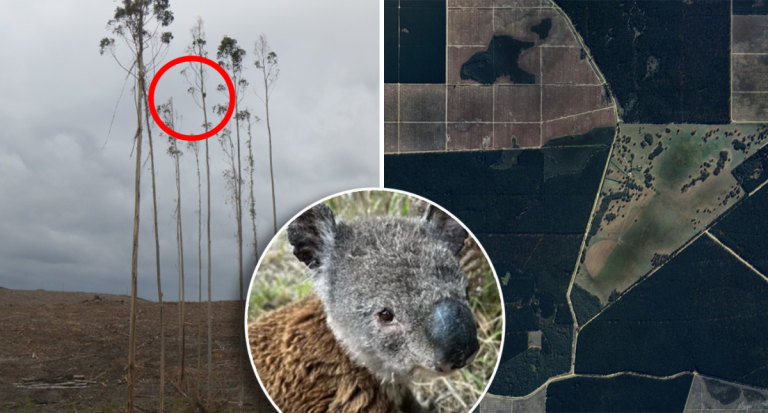Koalas are worth millions as a major tourist attraction to Australia. We celebrate their cuteness in fluffy toys, in books and cartoons, but in a remote corner of Australia, thousands of wild marsupials are facing starvation and death as their homes are cut down and turned into woodchips for export, a veteran ecologist warns.
Dr Stephen Phillips, principal investigator at BioLink, is concerned about the welfare of koalas living in southwestern Victoria in a timber plantation center called the Green Triangle. Although these farms were never designed to support koalas, their numbers have flourished due to the high nutrient levels of certain types of blue gum grown across the region's fertile basalt plains.
Victoria's Department of Environment (DEECA) has refused to support pre-harvest removal of koalas due to animal welfare concerns, but Phillips says leaving them on farms leads to avoidable injuries and displacement.
“I've been on these farms in the Southwest where I know very well that there are high densities of koalas. The injuries to these animals are horrific, some of them quite horrific,” he told Yahoo News. “And yet, our governments are turning a blind eye and hoping things will end well. But the reality is that it is not going away.”
Phillips says ecologists can now successfully move koalas into new areas of habitat with 100 percent success and no deaths. Areas such as the Grampians, where fires have decimated koala populations, could benefit from this process.
The estimate of koala abundance in Victoria may be wrong
After harvest, rescuers often report a spike in road-related deaths as koalas flee in search of new homes. Unfortunately, the areas they eventually reach are often forests that already contain very large populations, and this sometimes results in the koalas starving and needing to be euthanized.
The Victorian Government estimates there are 459,865 koalas living across the state, with the majority living in the south-west, with 210,277 koalas residing in native forests and 42,581 on farms. Because of this assumption about numbers, koalas are not listed as endangered as they are in New South Wales, Queensland and the ACT, and lack the same level of federal protection under the Environment Protection and Biodiversity Conservation Act (EPBC).
However, Phillips estimates that the number of koalas in Victoria could be significantly lower than government estimates, because his research has found that some areas contain large koala populations and in other areas of forest they are sparsely distributed. While he does not want to give a figure, he believes the population could be as high as 25 per cent of the government's estimate.
“The number of koalas is often used to exaggerate the scale of the problem. People will say that's a lot of bloody koalas. And of course it is. But it also means a tenfold reduction in that number. It doesn't really matter, it's about a humane, coordinated and informed approach.”
More about koalas in southwest Victoria
Authorities respond to koala concerns
Yahoo News has been reporting on the plight of koalas in southwest Victoria since 2020 and DEECA has declined all requests from Yahoo News to participate in an interview on the issue.
In response to questions about this article, it issued a statement saying it continues to work for the “long-term protection and survival of koalas in Victoria” and that its management strategy allows it to “better support” the farm industry in protecting the welfare of the animals and their habitats.
“The Victorian Government has invested more than $3 million over two years to support implementation of the strategy, including on-the-ground koala management programs, a statewide survey to paint a clearer and more accurate picture of koala abundance, and research to help conserve koalas in Victoria. Population in the future.”
Why will the koala problem disappear?
The koala problem is likely to diminish in the long term, as blue gum is increasingly replaced by pine trees that cannot serve as a forage tree. But Phillips wants the authorities to act now and develop a new plan to help koalas living on existing farms.
“They think the authorities think this will continue for several more years. And yes, we will have periodic tantrums from the community and other people, and eventually the problem will go away.”
“It's a terrible situation for Victoria. Many see Coke as a pest rather than a national identity.”
Do you love Australia's weird and wonderful environment? Get New newsletter View the best stories of the week.

